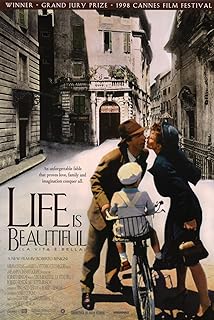美丽人生/一个快乐的传说(港)/
![]() 8.6 / 754,746人
116分鐘 | Italy:122分鐘 (first release)
8.6 / 754,746人
116分鐘 | Italy:122分鐘 (first release)
編劇: Vincenzo Cerami and 羅貝托貝里尼
演員: 羅貝托貝里尼 妮珂塔布拉斯奇 Giustino Durano Sergio Bini Bustric

2011-01-19 05:40:45
Beautiful Life, Beautiful Lie
************這篇影評可能有雷************
Three years. Twice. One good movie.
The tears I shed from my eyes are now shared with my lips. Time is fleeting and leaking between our fingers, while the sentiment I once received from the Oscar winner Life Is Beautiful still lingers.
The first semester I was sitting in a giant classroom with students from different colleges, watching the Italian movie together as a student society's program. Many, if not all, of the audience were so deeply touched that laughter was heard now and then, especially at the first half, while sorrows were felt in every one' s heart, for the boy Giosué, for his father Guido, and his mother Dora.
This was supposed to be a happy family, with Guido coming to the city to open a bookstore and Dora teaching in a local primary school. Accidental encounter linked the two, "Prince" Guido and "Princess" Dora. Guido fell for Dora at first sight and continued his effort to win her love. The first three encounters were almost sheer coincidences, while the following ones were virtually created by Guido. Pretending to be the inspector from Rome, he had the chance to see Dora and learnt her plan for the opera. He went to the opera solely for Dora and managed to drive her away in his friend's car which resembled her nominal fiancé's. With perfect luck and quick wit, he magically showed her love with the falling key, the doctor's answer and the coming hat, and attributed them to the mercy of Madonna. He began to lie, but the lies were beautiful.
Upon the time that he fetched the bride on to the green Jewish horse and left the banquet composedly and jocundly, a story about a Jew's sufferings during WWII was about to begin.
Little Giosué was born with a Jewish spoon in his mouth. He wondered when he saw a sign on a store window saying that Jews and dogs could not enter; Guido walked on and replied with a lie, "Because the storekeeper doesn't like Jews or dogs. People have love and hate differently." And he told Giosué that they would set up a notice in their bookstore that spiders and barbarians could not enter because they hated them. Racism was reduced to a joke and the little kid survived the test for the harshness of life.
Body language speaks as we are told. So it did when Guido was brought away by some officials from his bookstore. He just made a cheerful yet funny stride seemingly to tell Giosué that he was only leaving for a party. The stride lied, as we could feel the unspeakable heaviness in him about where he was heading for, in which case the courage to make believe was even more worthy of sympathy and respect. Giosué could not figure out why his father was so cheerful, and he smiled back. The second time Guido lied by a stride was shortly before his death and also before a rifle. In order to plant the last seed of hope in Giosué's mind, in a more exaggerated and lasting way, he strode into disappearance from Giosué's eyeshot and also from the earth and the life that he loved so much.
Another lie was born on the truck carrying them to the railway station, where they were collected and then sent to a certain concentration camp. Asked where they were going, Guido faltered until the journey hypothesis sealed up Giosué's inquisitive mouth. He didn't know either, nor did Dora, who followed his husband and son into the train. What they knew was that the train would reach no paradise, and this was what Giosué didn't know and could never know.
The lying culminated in Guido's interpretation to Giosué of the concentration camp life as a game. He intentionally misinterpreted the Nazi officer's orders into the explanation of the game rules, which said every participant had to grin and bear all obstacles to gain 1000 points, and the earliest winner would be awarded a real tank as the trophy. Little Giosué was convinced and allured: the tank was his dream while life was his father's goal. Against the hard labor he did every day, he kept optimistic and appeared always cheerful in front of his kid. Giosué wavered on hearing the scary truth and therefore begged to quit the game, Guido stimulated him back with the fantasized trophy.
The lie could not conceal Guido's love for Giosué and Dora. He broadcasted their safety and phonograghed his love with the opera by Offenbach which reminded them of their happy life. He could have escaped with his son on the eve of liberation, but Dora drew him so magnetically that he had to find his wife first. Unfortunately, he didn't find Dora and was captured by a Nazi soldier. The last stride came along with a wink that ignited the lie into something lofty and promising. Giosué stepped out of the case the next morning. The tank came to him surprisingly, with an American soldier in it. This was the trophy for him, also the trophy for his father, who sacrificed himself so as to let little Giosué live to enjoy the beautiful life.
Whatever adversity should be faced and tackled optimistically, sometimes even with beautiful lies, because we are deeply convinced that La Vita È Bella.
Giant Woo
2006-12-4

